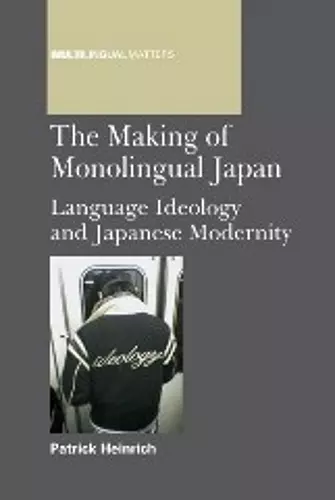The Making of Monolingual Japan
Language Ideology and Japanese Modernity
Format:Paperback
Publisher:Channel View Publications Ltd
Published:10th Feb '12
Currently unavailable, and unfortunately no date known when it will be back
This paperback is available in another edition too:
- Hardback£114.95(9781847696571)

Japan is widely regarded as a model case of successful language modernization, and it is often erroneously believed to be linguistically homogenous. There is a connection between these two views. As the first ever non-Western language to be modernized, Japanese language modernizers needed to convince the West that Japanese was just as good a language as the national languages of the West. The result was a fervent desire for linguistic uniformity. Today the legacy of modernist language ideology poses many problems to an internationalizing Japan. All indigenous minority languages are heading towards extinction, and this purposefully created homogeneity also affects the integration of immigrants and their languages. This book examines these issues from the perspective of language ideology, and in doing so the mechanisms by which language ideology undermines linguistic diversity are revealed.
Ellen: It’s an extraordinary achievement in terms of making a coherent argument out of material, mostly sources in Japanese, spanning the arc of over a century and a variety of disciplines. I think The Making of Monolingual Japan will stimulate future scholars, and I hope someone translates it into Japanese. It deserves to be widely read.
Chie: Let’s hope it is influential! It’s not only relevant to the Japanese language but to other contexts as well. His investigation of language ideologies can help us think about language education and policy at a global level.
-- Ellen Head, Miyazaki International College, Japan and Chie Tsurii, Momoyama Gakuin University, Japan * The Learner Development Journal, Issue 5 *The study of ideologies of language diversity is key to any understanding of modern language ecologies. Patrick Heinrich's monograph investigates the modernization of Japanese, tracks the rise of Japanese linguism and reveals the myth of Japan as a monolingual nation. He takes an active stance towards the subjugation of the Ryukyuan languages as mere dialects of Japanese as well as the repression of the language of the autochthonous Ainu. This publication presents a thorough analysis of the current language situation of Japan and provides an important reading on the impact of language ideologies on language ecologies.
* Matthias Brenzinger, University of Cape Town, South Africa *Dr Heinrich's book gives the Anglophone world information that was not easily available before. Now there are no excuses for sweeping claims about Japan and its language practices. With this book we have the detail to permit more nuanced assessment.
* Sue Wright, Emeritus Professor, Centre for European and International Studies Research, UK *This book stands as a tribute to Heinrich’s lengthy research on this topic drawing on a large number and broad range of native sources. Heinrich’s first-hand observations on the current state of language policy in Japan, its effects on language revitalization movements and suggestions in regards to future discussion of and research related to language policy are invaluable resources for researchers who lack the time or resources to pursue this type of in-depth study on their own. He has obviously considered multiple viewpoints and come to logical and well-constructed conclusions in developing his own approach to this complex issue. Heinrich’s work smoothly carries the reader along a winding chronological storyline. Topics likely unfamiliar to non-linguists and those less well-versed in ideological study are skillfully presented with little ambiguity.
* Ken Knight, University of Georgia, USA on LINGUIST List 24.994, 2013 *In conclusion, this book is more than a welcome addition to recent monographs in English on language policy and language ideologies in Japan. Overall, Heinrich’s study convincingly narrates the formation of modern Japanese language ideology, drawing on a wide range of literature in Japanese, English and German. His sources include those that pay primary attention to historical developments within Japan and others anchored in language policy and ideology more broadly that serve to raise general theoretical concerns.
* Noriko Watanabe, Kwansei Gakuin University, Japan in Language Policy (2014) 13:75–ISBN: 9781847696564
Dimensions: 210mm x 148mm x 12mm
Weight: 301g
216 pages